|
De Spaanse dichter en toneelschrijver Federico Garcia Lorca werd geboren op 5 juni 1898 in Fuente Vaqueros, Granada. Zie ook alle tags voor Federico Garcia Lorca op dit blog.
Of the Dark Doves
For Claudio Guillén
In the branches of the laurel tree
I saw two dark doves
One was the sun
and one the moon
Little neighbors I said
where is my grave —
In my tail said the sun
On my throat said the moon
And I who was walking
with the land around my waist
saw two snow eagles
and a naked girl
One was the other
and the girl was none
Little eagles I said
where is my grave —
In my tail said the sun
On my throat said the moon
In the branches of the laurel tree
I saw two naked doves
One was the other
and both were none.
Vertaald door Sarah Arvio
Sonnet of the Wreath of Roses
The wreath, quick, I am dying!
Weave it quick now! Sing, and moan, sing!
Now the shadow is darkening my throat,
and January’s light returns, a thousand and one times.
Between what needs me, and my needing you,
starry air, and a trembling tree.
A thickness of windflowers lifts
a whole year, with hidden groaning.
Take joy from the fresh landscape of my wound,
break out the reeds, and the delicate streams,
and taste the blood, spilt, on thighs of sweetness.
But quick! So that joined together, and one,
time will find us ruined,
with bitten souls, and mouths bruised with love.
Paso (The Images of the Passion)
Virgin in a crinoline,
Virgin of Solitude,
spreading immensely
like a tulip-flower.
In your boat of light,
go -
through the high seas
of the city.
through turbulent singing,
through crystalline stars.
Virgin in a crinoline
through the roadway’s river
you go,
down to the sea!
Vertaald door A. S. Kline
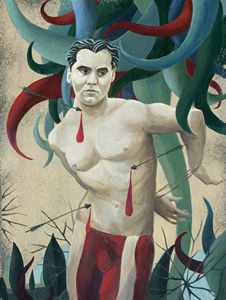
Federico García Lorca (5 juni 1898 – 19 augustus 1936)
“Federico García Lorca” door Alice Wellinger, 2011
De Nederlandse dichter en schrijver Adriaan Morriën werd geboren op 5 juni 1912 in Amsterdam. Zie ook alle tags voor Adriaan Morriën op dit blog.
Uit: Herinneringen aan Hans Lodeizen
“Hij zat vol invallen en plannen. Hij verlangde naar Amerika waar hij biologie had gestudeerd, vrienden had gemaakt en voor het eerst echt vrij was geweest. Hij leek op een Amerikaanse student, maar met de nerveuse gevoeligheid van het oude Europa bij de hand. Hij had reeds velerlei mensen ontmoet: filmspelers, regisseurs, zakenlieden, schrijvers, geleerden, miljonnairs, oude verwende vrouwen, jonge onberekenbare meisjes: een lift vol mensen die langzaam van boven naar beneden gaat, vol levens, vol herinneringen, een zware lift vol ellende en plezier, zoals het ergens in zijn gedichten staat. Hij hield van dieren en planten en wist er alles van. Hij had iets ontdekt in de samenleving van de mieren waarover hij een verslag had geschreven en waarvoor hij, als knaap nog, lid van een Brits biologisch genootschap was geworden. Hij leek zelf een beetje op een hond, een wijze fijngevoelige hond die nooit voor een kar is gespannen, maar veel in kamers heeft gezeten, door tuinen is gewandeld, mee op reis genomen, die muziek van Strawinsky heeft aangehoord en heeft gezien hoe mensen plezier vinden in boeken, wijn, mooie toiletten, gesprekken en in het willoze stilzitten. Een hond met meer wijsheid dan zijn meester en met een groter gemak om er afstand van te doen wanneer dat onder andere honden nodig is.
Ik heb hem slechts kort gekend, van het voorjaar 1949 tot aan zijn dood, de afgelopen zomer. Maar het laatste half jaar zag ik hem nauwelijks. Hij overleed in Zwitserland en enkele weken voor zijn dood zond hij mij een ansicht van een Zwitserse boer die op een manslange hoorn de midzomer inblaast; of uitblaast. Over zijn ziekte geen woord. Het was een grap die ik na zijn dood als een terechtwijzing heb opgevat omdat ik hem nog altijd niet geschreven had. Zo gaan al mijn verre vrienden dood, zonder een brief van mij. Op deze wijze, dacht ik, zou ik zelf een vriend willen terechtwijzen en als een goed speler willen scheiden.
Hij herinnerde mij door allerlei reacties aan mijn eigen manier van doen toen ik zo oud was als hij en ik nog de tijd had omdat ik werkeloos was. Ook hij was werkeloos maar op een andere manier. Hij had zijn studie afgebroken en verzette zich tegen een maatschappelijke bezigheid die hij toch als iets onafwendbaars op zich zag afkomen. Hij had de tijd, al was het slechts voor een achtermiddag.”
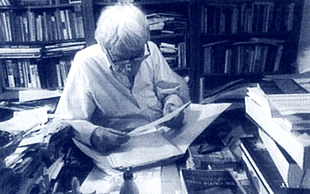
Adriaan Morriën (5 juni 1912 – 7 juni 2002)
De Engelse schrijver Ken Follett werd geboren op 5 juni 1949 in Cardiff, Wales. Zie ook alle tags voor Ken Follett op dit blog.
Uit:Edge Of Eternity
“In the staff room she checked the emergency timetable on the notice board. Most of her classes were doubled today, two groups of pupils crammed into one room. Her subject was Russian, but she also had to teach an English class. She did not speak English, though she had picked up a smattering from her British grandmother, Maud, still feisty at seventy.
This was the second time Rebecca had been asked to teach an English class, and she began to think about a text. The first time, she had used a leaflet handed out to American soldiers, telling them how to get on with Germans: the pupils had found it hilarious, and they had learned a lot too. Today perhaps she would write on the blackboard the words of a song they knew, such as “The Twist” — played all the time on American Forces Network radio — and get them to translate it into German. It would not be a conventional lesson, but it was the best she could do.
The school was desperately short of teachers because half the staff had emigrated to West Germany, where salaries were three hundred marks a month higher and people were free. The story was the same in most schools in East Germany. And it was not just teachers. Doctors could double their earnings by moving west. Rebecca’s mother, Carla, was head of nursing at a large East Berlin hospital, and she was tearing her hair out at the scarcity of both nurses and doctors. The story was the same in industry and even the armed forces. It was a national crisis.
As Rebecca was scribbling the lyrics of “The Twist” in a notebook, trying to remember the line about “my little sis”, the deputy head came into the staff room. Bernd Held was probably Rebecca’s best friend outside her family. He was a slim, dark-haired man of forty, with a livid scar across his forehead where a shard of flying shrapnel had struck him while defending the Seelow Heights in the last days of the war. He taught physics, but he shared Rebecca’s interest in Russian literature, and they ate their lunchtime sandwiches together a couple of times a week. “Listen, everybody,” Bernd said. “Bad news, I’m afraid. Anselm has left us.”

Ken Follett (Cardiff, 5 juni 1949)
Cover
De Australische schrijfster Margo Lanagan werd geboren op 5 juni 1960 in Waratah, New South Wales. Zie ook alle tags voor Margo Lanagan op dit blog.
Uit:Singing My Sister Down
“I played well, out of the surprise of her not minding. I couldn’t’ve played better. I heard everyone else being surprised, too, at the end of those tunes, that they must’ve all known too, too well from all my practising.
I sat down, very hungry. Mumma passed me the water-cup and a damp-roll.
I’m stuck now, said Ik, and it was true—the tar had her by the feet, closed in a gleaming line like that pair of zipper-slippers I saw once in the shoe-master’s vitrina.
Oh yeah, well and truly stuck, said Mumma. But then, you knew when you picked up that axe-handle you were sticking yourself.
I know.
No coming unstuck from this one. You could’ve let that handle lie. That was some serious teasing.
No, I couldn’t, Mumma, and you know.
I do, baby chicken. I always knew you’d be too angry, once the wedding-glitter rubbed off your skin. It was a good party, though, wasn’t it? And they laughed at each other, Mumma having to steady Ikky or her ankles would’ve snapped over. And when their laughter started going strange Mumma said, Well, this party’s going to be almost as good, ’cause it’s got children. And look what else! And she reached for the next ice-basket.
And so the whole long day went, in treats and songs, in ice and stink and joke-stories and gossip and party-pieces. On the banks, people came and went, and the chief sat in his chair and was fanned and fed, and the family of Ikky’s husband sat around the chief, being served too, all in purple-cloth with flashing edging, very prideful.“
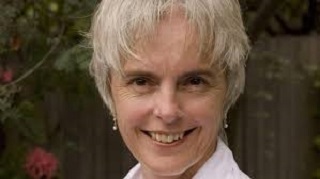
Margo Lanagan (Waratah, 5 juni 1960)
De Nederlandse literair criticus Carel Peeters werd geboren in Nijmegen op 5 juni 1944. Zie ook alle tags voor Carel Peeters op dit blog.
Uit: Kan het licht aanblijven? (Over Frans Kellendonk)
“Aangezien Kellendonk niet in God gelooft is het onduidelijk welke metafysische ideeën hij aanhangt; maar in de discussie naar aanleiding van de opmerkingen van kardinaal Simonis over de tegennatuurlijkheid van homoseksualiteit mag hij de kardinaal graag in bescherming nemen, ook al vindt hij de uitspraken van de kardinaal met een curieuze kwalificatie ‘overbodig’. De charme van die uitspraken schijnt te schuilen in hun theologische schoonheid: ‘De katholieke visie op het geslachtsleven is een wonder van theoretische schoonheid, die echter nog maar weinig in praktijk gebracht wordt. De seksuele revolutie heeft daar geen samenhangende visie tegenover kunnen stellen. Vrijheid blijheid, is steeds de leus geweest.’
Kennelijk is er iets mis met de leus ‘vrijheid, blijheid’. Daar kan volgens mij nooit iets mee mis zijn, omdat de logica wil dat waar vrijheid is ook de vrijheid bestaat zichzelf beperkingen op te leggen. Dat dit niet altijd gedaan wordt, en dat men dan op de koffie komt, doet niets af aan de waarde van het principe. Wie nooit zijn hoofd gestoten heeft weet niet hoe hard het is. Kellendonk is echter van mening dat die vrijheid op een of andere manier ‘metafysisch’ beperkt moet worden. Het is wel uiterst wrang dat hij als bewijs daarvoor aids aanvoert en zelfs schrijft dat aids ‘het zoveelste echec van de Verlichting’ laat zien. Is er dan verband tussen aids en de Verlichting?
Dat verband is er in zoverre dat de Verlichting er (in een langdurig proces) mede voor heeft gezorgd dat een grote seksuele vrijheid ontstond. Van seksuele vrijheden gebruikmaken is echter niet een exclusief voorrecht van de twintigste eeuw. Degenen die zich in dit opzicht in de negentiende eeuw weinig beperkingen oplegden konden gemakkelijk syfilis oplopen, dat risico was eraan verbonden. Het verschil tussen syfilis en aids is gradueel: aids doet zich op grotere schaal voor.
Wie zulke grote, maar even dunne verbanden legt tussen aids en de Verlichting als Kellendonk is met een kruistocht bezig, zo omvangrijk dat het niet anders kan dan dat de versimpelmachine aan het werk is.”
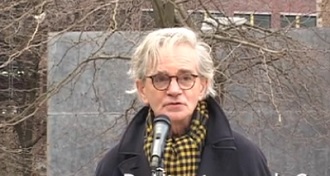
Carel Peeters (Nijmegen, 5 juni 1944)
De Nederlandse dichter, schrijver en schilder Robert Marie Philmain Joseph Franquinet werd geboren in Amby (bij Maastricht) op 5 juni 1915. zie ook alle tags voor Robert Franquinet op dit blog.
Uit: Drijfzand
“Beelden tuimelen door me heen. Het rugbeeld van Carla. Wat is herinnering? Waar houdt de werkelijkheid van Carla op en waar begint de onwerkelijkheid van de nostalgie? Welke dokter kan haar meten?
Ik ben vannacht over het staketsel geklommen, de fles die in mijn polsader steekt achter me aan slepend. Ze hebben me met handen en voeten aan het verchroomde bed vastgesnoerd. De ochtendverpleegster treft me zo aan. Ik herinner me in de nevelige zone het watergrijs van haar blik. Haar gelaat komt af en toe opdoemen. Ik herinner me nu ook haar stem. Vóór de laatste operatie zei ze: ‘ze doet geen pijn, ze is alleen maar vermoeiend.’
In de gevangenis van de geheime politie, waar we werden afgetuigd op allerlei manieren, zei ik tot mezelf: ‘pijn is een begrensd iets, wanneer ze zo hevig is dat je ze niet meer verdraagt verlies je het bewustzijn.’
Ik tast naar mijn kaalgeschoren schedel. De luiken zijn weer dicht. Verdwenen onder de schedelhuid. Carla is niet gekomen. Ze komt nooit meer. Ik heb haar eens gezegd dat ik voor één nacht met haar een jaar politiegevangenis wil overdoen. En nu nog wil ik voor een teder woord heel dit proces van lichamelijke uitmergeling, gebrokenheid, vernedering opnieuw ondergaan. Waanzin. Maar zonder die waanzin is het leven als een ketting van leeggelopen dagen.
Hoe ben ik hier op de operatietafel terecht gekomen? Ik weet er niets meer van. Prof Guylot heeft gezegd: ‘indien ik hem niet opereer heeft hij nog twee jaar.’
Wanneer ik chemisch ben ontleed begint de meetkunde in de ruimte. Elektroniek. Radar en ultrasone straal. Minizender. Radiografische maten. Komputer. Ik hoor rekenen in frakties van millimeters en in mikrons die de afstanden van de kernen onder elkaar, van de cellen in het grijze merg aangeven. Atomen. Zelfs de punt van een operatienaald is te grof voor deze precisie.”
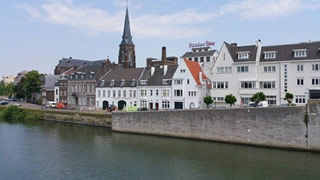
Robert Franquinet (5 juni 1915 - 30 mei 1979)
Amby
De Engelse schrijfster Margaret Drabble werd geboren op 5 juni 1939 in Sheffield, Yorkshire. Zie ook alle tags voor Margaret Drabble op dit blog.
Uit: The Dark Flood Rises
“She has often suspected that her last words to herself and in this world will prove to be 'You bloody old fool' or, perhaps, depending on the mood of the day or the time of the night, 'you fucking idiot'. As the speeding car hits the tree, or the unserviced boiler explodes, or the smoke and flames fill the hallway, or the grip on the high guttering gives way, those will be her last words. She isn't to know for sure that it will be so, but she suspects it. In her latter years, she's become deeply interested in the phrase 'Call no man happy until he is dead.' Or no woman, come to that. 'Call no woman happy until she is dead.' Fair enough, and the ancient world had known women as well as men who had met unfortunate ends: Clytemnestra, Dido, Hecuba, Antigone. Though of course Antigone, one must remember, had rejoiced to die young, and in a good (if to us pointless) cause, thereby avoiding all the inconveniences of old age.
Fran herself is already too old to die young, and too old to avoid bunions and arthritis, moles and blebs, weakening wrists, incipient but not yet treatable cataracts, and encroaching weariness. She can see that in time (and perhaps in not a very long time) all these annoyances will become so annoying that she will be willing to embark on one of those acts of reckless folly that will bring the whole thing to a rapid, perhaps a sensational ending. But would the rapid ending cancel out and negate the intermittent happiness of the earlier years, the long struggle towards some kind of maturity, the modest successes, the hard work? What would the balance sheet look like, at the last reckoning?”
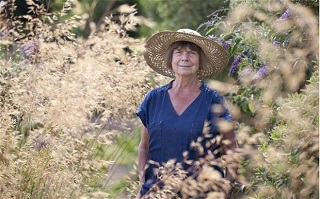
Margaret Drabble (Sheffield, 5 juni 1939)
De Amerikaanse schrijfster Kristin Carlson Gore werd geboren op 5 juni 1977 in Carthage, Tennessee Zie ook alle tags voor Kristin Gore op dit blog.
Uit:Sammy's House
“Had we been as eager to whine to the press, we might have garnered comparable support, but we weren't the same breed of tattletales. And even taking pride in that was immature. The whole embarrassing rivalry gave me flashbacks to junior high.
Which, frankly, didn't seem all that long ago. I was twenty-eight now and working as a health care advisor to the White House, but I still often felt as awkward and unsure of myself as I had during those halcyon days of orthodontic headgear and New Kids on the Block fan clubs. Though I'd spent a few fascinating years as a Capitol Hill staffer to then Senator Robert Gary (RG to his staff), the White House was an entirely different universe. The stakes, the pressure, the perpetual potential for both extraordinary progress and crippling failure-everything was ratcheted up to a spectacular intensity now that I worked for the president and vice president of the United States. More than ever before, I felt like I needed to constantly prove myself in a new world full of gossip and cliques and all sorts of social politics. So in some ways, the junior high flashbacks were apropos. Though perhaps I had slightly more of a shot at a date with New Kid heartthrob Jordan Knight now. Slightly.
Amid the fear and anxiety, I also felt a certain wide-eyed wonder at everything I was witnessing. At the inauguration of Wye and RG, I'd been awed by the sight of democracy in action. After a hard-fought, nasty election cycle, it had been thrilling and refreshing to observe the peaceful transfer of power. I'd watched everything from the sidelines, humbled by the remarkable nature of such an event, and grateful to be on the happier end of it. Granted, a week later I'd felt considerably less idealistic about the whole thing when I'd had to wear a surgical mask at my desk to filter the rancid fumes of decomposing mice. And now those same clever saboteurs had disrupted our year-and-a-half-late victory cruise by paying a woman to take her clothes off. They were classy, classy folks.”
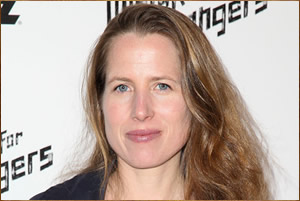
Kristin Gore (Carthage, 5 juni 1977)
Zie voor nog meer schrijvers van de 5e juni ook mijn vorige blog van vandaag.
|



